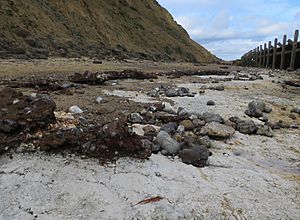Beeston Cliffs facts for kids
| Site of Special Scientific Interest | |
 |
|
| Area of Search | Norfolk |
|---|---|
| Interest | Biological Geological |
| Area | 10.3 hectares (25 acres) |
| Notification | 1985 |
| Location map | Magic Map |
Beeston Cliffs is a really special place located in Sheringham, Norfolk. It covers about 10.3 hectares (which is roughly the size of 25 football fields!). This area is protected because it's a Site of Special Scientific Interest (SSSI), meaning it's important for both its amazing plants and its ancient rocks.
Contents
Beeston Cliffs: A Natural Treasure
Beeston Cliffs is officially recognized as a Site of Special Scientific Interest (SSSI). This means the area has unique natural features that are protected by law. It's special for two main reasons: its geology (the study of rocks and how Earth was formed) and its biology (the study of living things).
What Makes Beeston Cliffs So Unique?
Beeston Cliffs is like a giant history book written in layers of rock and soil. It helps scientists understand what the Earth was like millions of years ago.
A Window into Earth's Ancient Past
This site is super important for understanding a time period called the Beestonian stage. This stage happened during the Early Pleistocene epoch, which was between 1.8 and 0.8 million years ago. Think of it as a very long time ago, when the Earth's climate was changing a lot, leading to what we call the Ice Ages.
At Beeston Cliffs, you can see layers of rock that show us what the environment was like back then. Some layers were formed by the sea, and others by freshwater, like rivers or lakes. These layers help scientists piece together the story of how the landscape and climate changed over hundreds of thousands of years. It's a key spot for understanding the history of our planet!
Rare Plants and Coastal Wonders
Beyond its ancient rocks, Beeston Cliffs is also home to some very special plants. One of the most exciting finds here is a plant called purple broomrape. This plant is nationally rare, meaning it's not found in many other places in the country.
The purple broomrape grows in a specific type of soil found on the clifftop. This soil is called calcareous grassland, which means it has a lot of calcium carbonate (like chalk or limestone). This special soil helps unique plants like the purple broomrape to thrive.
Can You Visit Beeston Cliffs?
Yes, you can! Beeston Cliffs is open to the public, so you can explore this amazing natural site for yourself. It's a great place to learn about geology, spot unique plants, and enjoy the beautiful coastal views.

